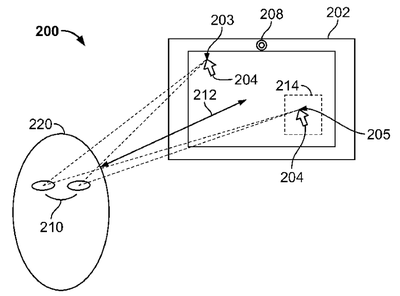Apple Patents Eye-Tracking Software Feature for Possible Use on Mac and iOS
The U.S. Patent and Trademark Office today granted an Apple patent, originally filed in April of 2012, that deals with eye-tracking technology used to control a user interface on a computer or smartphone (via AppleInsider). The specific invention involves a method for ensuring users do not lose track of a cursor while controlling their devices through eye-tracking movements.
The patent, with inventor credit going to David P. Julian, describes future Mac, iPhone, and iPad devices that could include the new camera technology, allowing movements of a user's eye to translate to the movement of a cursor on screen. The patent doesn't go into deep detail describing any further practical use of the "gaze control" technology, though it does mention in passing the possible use such advancements could have in vehicles, game consoles, and entertainment systems.

The patent mostly attempts to battle the Troxler Effect, an optical effect that causes objects in the periphery to begin to disappear when a user focuses on a particular point on-screen. This is a particularly troubling issue with retina-tracking technology, which requires a user to focus on various on-screen interface prompts to properly work.
Apple's invention seeks to counteract the Troxler Effect by monitoring eye movements and blinking to estimate when a user is likely to be losing track of a mouse pointer or other cursor due to the effect. The system would automatically move the cursor to bring it back to visibility.
In certain configurations, the eye tracking system may persistently render the movable indicator wherever the user looks in the GUI. This rendering of the movable indicator may be accurate to the degree that the movable indicator becomes a stabilized retinal image with respect to the user's eyes. As such, the movable indicator may fade with respect to the user's perception of the GUI. In other words, the movable indicator may no longer be visible to the user. In such situations, it is desirable to restore the user's perception of the movable indicator to counteract this fading effect. Accordingly, the eye tracking system described herein may automatically alter the position, appearance, or both of the movable indicator so that it is no longer a stabilized retinal image and can be perceived by the user.
A handful of older patents filed by the company have been released by the Patent and Trademark Office as of late, including a transforming home-button-to-gaming-joystick just last week. Like all other patents, the possibility of the eye-tracking tech showing up anytime soon in an Apple product is very slim, but is an interesting glimpse into the company's possible future nonetheless.
Popular Stories
Apple hasn't updated the AirPods Pro since 2022, and the earbuds are due for a refresh. We're counting on a new model this year, and we've seen several hints of new AirPods tucked away in Apple's code. Rumors suggest that Apple has some exciting new features planned that will make it worthwhile to upgrade to the latest model.
Subscribe to the MacRumors YouTube channel for more videos.
Heal...
Chase this week announced a series of new perks for its premium Sapphire Reserve credit card, and one of them is for a pair of Apple services.
Specifically, the credit card now offers complimentary annual subscriptions to Apple TV+ and Apple Music, a value of up to $250 per year.
If you are already paying for Apple TV+ and/or Apple Music directly through Apple, those subscriptions will...
Popular accessory maker Anker this month launched two separate recalls for its power banks, some of which may be a fire risk.
The first recall affects Anker PowerCore 10000 Power Banks sold between June 1, 2016 and December 31, 2022 in the United States. Anker says that these power banks have a "potential issue" with the battery inside, which can lead to overheating, melting of plastic...
In 2020, Apple added a digital car key feature to its Wallet app, allowing users to lock, unlock, and start a compatible vehicle with an iPhone or Apple Watch. The feature is currently offered by select automakers, including Audi, BMW, Hyundai, Kia, Genesis, Mercedes-Benz, Volvo, and a handful of others, and it is set to expand further.
During its WWDC 2025 keynote, Apple said that 13...
Apple's next-generation iPhone 17 Pro and iPhone 17 Pro Max are around three months away, and there are plenty of rumors about the devices.
Apple is expected to launch the iPhone 17, iPhone 17 Air, iPhone 17 Pro, and iPhone 17 Pro Max in September this year.
Below, we recap key changes rumored for the iPhone 17 Pro models:Aluminum frame: iPhone 17 Pro models are rumored to have an...
Apple last month announced the launch of CarPlay Ultra, the long-awaited next-generation version of its CarPlay software system for vehicles.
There was news this week about which automakers will and won't offer CarPlay Ultra, and we have provided an updated list below.
CarPlay Ultra is currently limited to newer Aston Martin vehicles in the U.S. and Canada. Fortunately, if you cannot...
Apple will finally deliver the Apple Watch Ultra 3 sometime this year, according to analyst Jeff Pu of GF Securities Hong Kong (via @jukanlosreve).
The analyst expects both the Apple Watch Series 11 and Apple Watch Ultra 3 to arrive this year (likely alongside the new iPhone 17 lineup, if previous launches are anything to go by), according to his latest product roadmap shared with...
Apple is planning to launch a low-cost MacBook powered by an iPhone chip, according to Apple analyst Ming-Chi Kuo.
In an article published on X, Kuo explained that the device will feature a 13-inch display and the A18 Pro chip, making it the first Mac powered by an iPhone chip. The A18 Pro chip debuted in the iPhone 16 Pro last year. To date, all Apple silicon Macs have contained M-series...
























